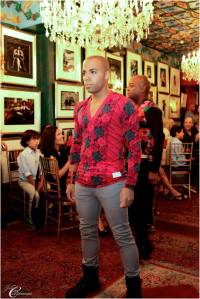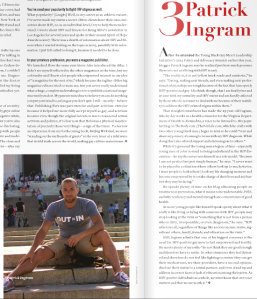Earlier this year Thomas, Adrian, and I had the opportunity to attend the Young Black Gay Men’s Leadership Initiative’s Policy & Advocacy Summit in Atlanta. I can tell you this is going to be bigger and better! If you are 18-29 years old and identify as a Black gay, bisexual, same gender loving, or as a man who has sex with men then apply. Below is the press release with additional answers to some frequent questions. You can reach the application here. Please share with your networks and get the word out to ensure people have the ability to apply. Applications are open until January 5 at 5:00pm EST.

The Young Black Gay Men’s Leadership Initiative (YBGLI) is excited to announce its third Policy & Advocacy Summit (PAS). The PAS will bring together young Black gay, bisexual, and same gender loving men from various parts of the United States in order to help them become better advocates and leaders within their communities.
Applicants are selected based on a proven track of individual leadership, community mobilization and/or ability to conduct grassroots organizing at the local, state, and/or regional level. The PAS will include various policy, advocacy, and mobilization -based workshops that are designed to encourage activism through new media and ongoing engagement with the community.
If you – or someone you know – would be a good fit for the 2015 PAS, please complete this application. Summit applicants are due Monday, January 5, 2015, 5:00 p.m. EST. Applicants will be notified of their application status by email no later than Monday, January 26, 2015.
2015 Policy & Advocacy Summit Application
FAQ’s about the 2015 Policy & Advocacy Summit
1.) What is the Policy & Advocacy Summit (PAS)?
The PAS aims to build capacity and promote leadership among young Black gay, bisexual, and same gender loving men in order to help them become better advocates and leaders within their community. The PAS will include various policy, advocacy, and mobilization -based workshops that are designed to encourage activism through new media and ongoing engagement with the community.
2.) Who is eligible to apply/attend the 2015 PAS?
Eligible applicants are U.S. citizens between the ages of 18 – 29 years who are
- African American/Black, and identify as
- Gay, bisexual, same gender loving, or as a man who has sex with men.
3.) How does the application process work?
The application is available at www.ybgli.org. All applicants are required to submit an application that includes submission of a resume/CV. No application will be considered complete without a resume or CV. The deadline to submit your application is Monday, January 5, 2015 5:00 p.m. EST. All selected applicants will be notified of their status by email no later than Monday, January 26, 2015.
4.) What is expected of my participation in the PAS?
Selected applicants are expected to participate in a pre-conference webinar shortly after being selected for the Summit. Webinar information will be included in acceptance package. Additionally, selected applicants are expected to participate fully during all PAS-related activities and to demonstrate excellent judgment and character while at the PAS.
5.) What is the cost to attend the PAS?
There is no cost associated with attending the 2015 PAS. However, please let us know if your employer/organization would be willing to subsidize your participation in the PAS through financial or other in-kind donations. This will allow us to finance more participants. Please note this information will NOT help or hurt your application, as the 2015 PAS selection process is double-blind.
6.) What should I wear/bring to the PAS?
Participants are expected to dress in business attire throughout the 2015 PAS. Participants who choose not to dress in business casual attire may be asked not to participate in PAS-related activities and/or asked to leave the PAS entirely. Participants will be encouraged to use their cellphones, tablets, and/or laptops throughout the PAS in order to utilize social and digital media. However, YBGLI is not responsible for any lost or stolen items.
7.) What will I learn/do at the summit?
Among other things, 2015 PAS participants will…
- Network with other young Black gay, bisexual, and same gender loving men from across the United States.
- Develop policy, advocacy, and interpersonal communication skills through workshops and institutes.
- Learn about issues affecting young Black gay, bisexual, and same gender loving men from respected experts in a diversity of fields, including health, research, policy, advocacy, community mobilization, and communications.
- Have fun!
8.) How many participants will attend the summit?
The 2015 PAS will bring together up to 60 participants from across the United States.
9.) Are transgender or gender non-conforming men eligible to participate in the 2015 PAS?
Yes, the PAS is open to transgender men and gender non-conforming men.
10.) Who should I contact if I have more questions about the 2014 PAS summit?
Contact the YBGLI Organizing Committee at summit@ybgli.org for summit related questions and to inquire about sponsorship opportunities.
11.) What is the location and date of the 2015 PAS?
The location and date will be included in the acceptance package. You will have two weeks to confirm acceptance.
12.) If I can’t – or am not chosen to – attend the summit, how else can I participate/get involved with YBGLI?
Contact the YBGLI Organizing Committee at leadership@ybgli.org for additional opportunities to stay connected. In the meantime, follow us on Facebook and Twitter.
 This December 1st, it will be three years since I
This December 1st, it will be three years since I 


 After he attended the Young Black Gay Men’s Leadership Initiative’s 2014 Policy and Advocacy Summit earlier this year, blogger Patrick Ingram says he realized just how much pressure there is to act as if living with HIV is easy.
After he attended the Young Black Gay Men’s Leadership Initiative’s 2014 Policy and Advocacy Summit earlier this year, blogger Patrick Ingram says he realized just how much pressure there is to act as if living with HIV is easy.











 WASHINGTON, D.C. (July 7, 2014) – The ADAP Advocacy Association, also known as aaa+, today announced the recipients for its 2014 Annual ADAP Leadership Awards, which recognizes individual, community, government, media and corporate leaders who are working to improve access to care and treatment under the AIDS Drug Assistance Programs. The eight leadership awards will be presented during the 4th Annual ADAP Leadership Awards Dinner being held on Monday, August 4th at 7:00 pm in Washington, DC. The dinner will be held in conjunction with its 7th Annual Conference, being held at the Westin Washington DC City Center on August 3-5, 2014.
WASHINGTON, D.C. (July 7, 2014) – The ADAP Advocacy Association, also known as aaa+, today announced the recipients for its 2014 Annual ADAP Leadership Awards, which recognizes individual, community, government, media and corporate leaders who are working to improve access to care and treatment under the AIDS Drug Assistance Programs. The eight leadership awards will be presented during the 4th Annual ADAP Leadership Awards Dinner being held on Monday, August 4th at 7:00 pm in Washington, DC. The dinner will be held in conjunction with its 7th Annual Conference, being held at the Westin Washington DC City Center on August 3-5, 2014.